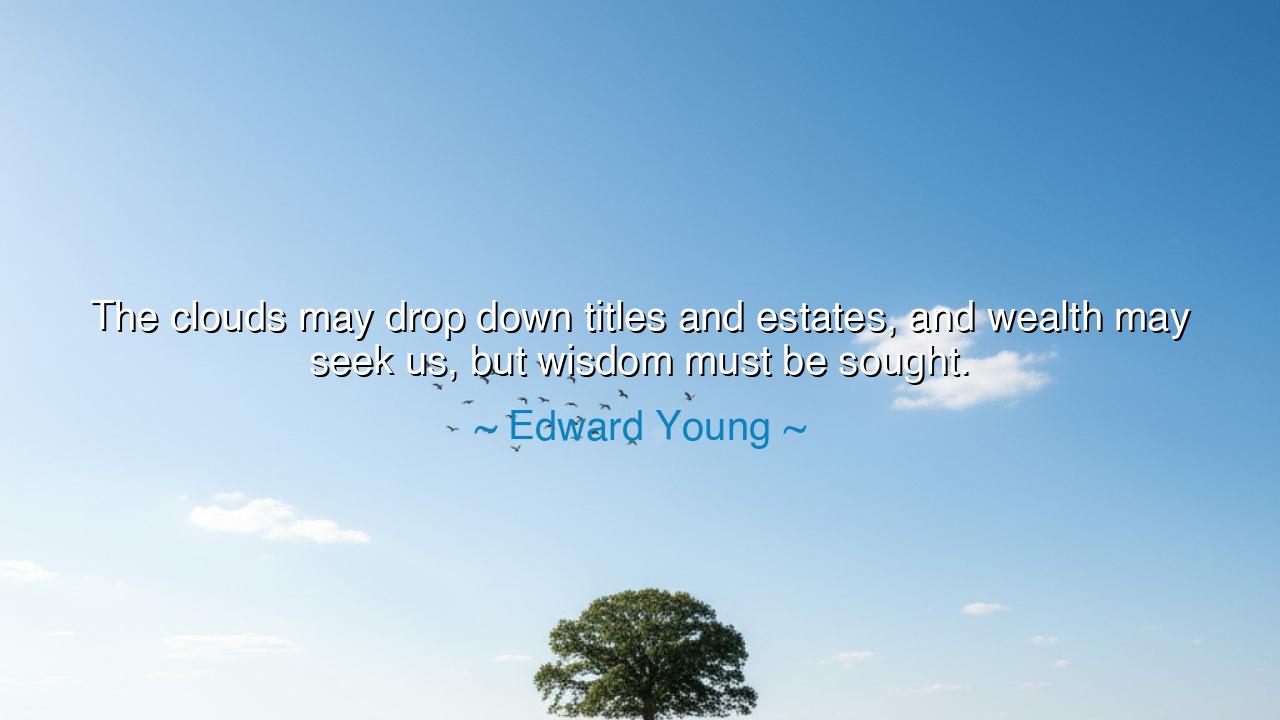
The clouds may drop down titles and estates, and wealth may seek
The clouds may drop down titles and estates, and wealth may seek us, but wisdom must be sought.






There are gifts in this world that fall upon us like rain from the heavens—titles, estates, and wealth may descend without effort, granted by birth, fortune, or the whims of fate. Yet Edward Young, the poet-philosopher, reminds us of a higher truth in his words: “The clouds may drop down titles and estates, and wealth may seek us, but wisdom must be sought.” These words speak to the eternal difference between what is given and what is earned, between the fleeting treasures of earth and the everlasting light of understanding.
Titles and wealth can be inherited, bestowed by kings, or acquired by chance. They adorn the outward life but do not shape the soul. A man may be born into a palace and yet dwell in ignorance, or rise from humble origins and rule with greatness. Wisdom, unlike these external gifts, cannot be granted by others. It must be sought, pursued through reflection, discipline, and a heart willing to face truth, however painful. Thus, the seeker of wisdom walks a road that no servant or crown can tread for them.
History offers a lesson in the life of Marcus Aurelius, the Roman emperor. Born to privilege, he inherited the greatest throne of his age—titles, estates, and unimaginable wealth. Yet Marcus did not rely on these gifts to guide his reign. Instead, he turned inward, seeking wisdom through philosophy and self-mastery. His writings in Meditations reveal a man constantly striving to rule himself before ruling others. Though the clouds of fate had rained glory upon him, it was his seeking of wisdom that made him a just and beloved leader.
Conversely, many have been destroyed by gifts they did not earn. Consider the tragic reign of Louis XVI of France. Surrounded by opulence and privilege, he lacked the understanding to see the suffering of his people. His titles and wealth isolated him, while his failure to seek wisdom led to revolution and his own downfall. This tale warns us that unearned fortune, without inner growth, becomes a burden that drags both ruler and realm into ruin.
Let this teaching be inscribed upon the hearts of all who walk the path of life: do not envy the one who wears a crown or holds vast treasure, for these things may fall like rain today and vanish like mist tomorrow. Instead, devote yourself to the tireless pursuit of wisdom, for it alone cannot be stolen, inherited, or destroyed. Seek it as a thirsty traveler seeks water, and it will guide you through the storms of fate. For while the clouds may give, only the soul can truly attain.






TDTrinh Duc
This quote prompts me to think about the effort required for personal growth. Material and social rewards may seem to fall into our laps, but wisdom demands curiosity, discipline, and reflection. I wonder whether wisdom is more accessible to those who already have the luxury of resources, or if it is truly independent of material circumstance. How can individuals from diverse backgrounds pursue wisdom effectively, even when external conditions are challenging?
THNguyen Thanh Huy
I feel intrigued and a little challenged by this statement. It suggests that wisdom is not naturally conferred like wealth or status, which can arrive unexpectedly. How can individuals cultivate a lifelong commitment to learning and introspection? Additionally, what role does society play in promoting or hindering the pursuit of wisdom? It makes me think about the value systems we inherit and how they shape our definition of a meaningful life.
NDVU Nguyen Dac
This perspective makes me reflect on human priorities. It seems that people often chase titles and wealth, expecting them to bring fulfillment, but wisdom remains elusive without conscious effort. I wonder how one can balance the pursuit of practical success with the search for deeper understanding. Can wisdom coexist with ambition for material gains, or does true insight require a degree of detachment from worldly pursuits?
HTNguyen Hong Thuy
Reading this evokes a sense of challenge and responsibility. While material gains may come without effort, acquiring wisdom demands intentional pursuit. How do we motivate ourselves to seek wisdom in a culture that often glorifies instant success and tangible rewards? Are there specific practices, mentors, or life experiences that accelerate the development of wisdom, or is it something that unfolds gradually through reflection and learning from mistakes?
RRobloxScreenShot20190504_013757637
This quote highlights the contrast between external rewards and inner growth. It makes me wonder why society often prioritizes wealth and status over wisdom. Can true wisdom ever be acquired passively, or does it require deliberate effort and reflection? I’m also curious about how modern education systems could do more to cultivate wisdom rather than simply preparing people for material success. Is wisdom a skill that can be systematically developed, or is it inherently personal and experiential?